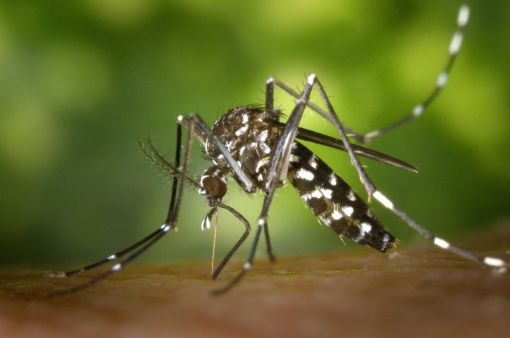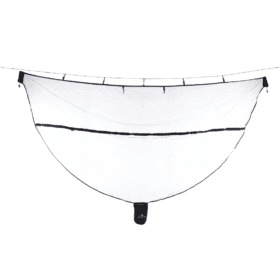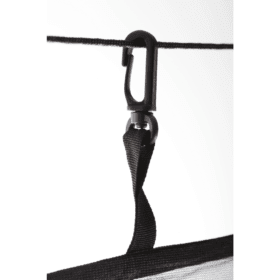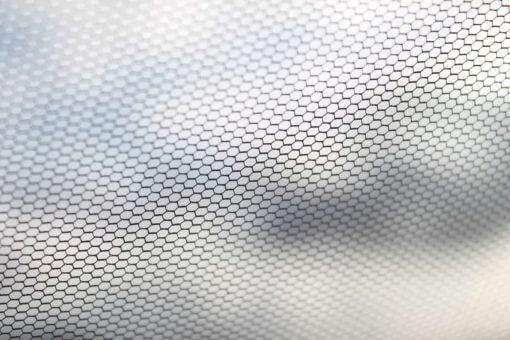How To Choose Hammock Mosquito Nets – Expert Advice
Choosing the Best Hammock Mosquito Net
 Photo by Jared Belson Whether you are on a week-long trip through the southern Appalachians or simply trying to hang out in your backyard on a Summer afternoon, it’s important to plan for mosquitos and other biting bugs. And while there is no shortage of mosquito-repelling products available to outdoor enthusiasts, they all have pretty significant drawbacks, and few work as well as advertised. However, for those who like hanging out in a camping hammock, there is a very effective solution to the mosquito problem: A mosquito net. When properly constructed and attached to a hammock, a mosquito net provides a nearly fool-proof way of protecting your skin from biting insects. But mosquito nets for hammocks are not all created equally, and some work much more effectively than others do. Select a high-quality mosquito net and you’ll be able to enjoy your hammock without suffering one bite after another; select a poorly made net and you may as well offer yourself up on a buffet table for the bugs. Below, we’ll explain some of the most important things to consider when picking a mosquito net for your hammock and discuss a few of the things you’ll want to consider when making your selection. But, we’ll begin by pointing out the myriad reasons that it is a good idea to use a mosquito net.
Photo by Jared Belson Whether you are on a week-long trip through the southern Appalachians or simply trying to hang out in your backyard on a Summer afternoon, it’s important to plan for mosquitos and other biting bugs. And while there is no shortage of mosquito-repelling products available to outdoor enthusiasts, they all have pretty significant drawbacks, and few work as well as advertised. However, for those who like hanging out in a camping hammock, there is a very effective solution to the mosquito problem: A mosquito net. When properly constructed and attached to a hammock, a mosquito net provides a nearly fool-proof way of protecting your skin from biting insects. But mosquito nets for hammocks are not all created equally, and some work much more effectively than others do. Select a high-quality mosquito net and you’ll be able to enjoy your hammock without suffering one bite after another; select a poorly made net and you may as well offer yourself up on a buffet table for the bugs. Below, we’ll explain some of the most important things to consider when picking a mosquito net for your hammock and discuss a few of the things you’ll want to consider when making your selection. But, we’ll begin by pointing out the myriad reasons that it is a good idea to use a mosquito net.
Shop Montem’s Selection of Mosquito Nets
Why Do You Need a Mosquito Net for Your Hammock?
Many people consider a mosquito net to be an optional piece of equipment, but this downplays the problems that mosquitos can cause. In actuality, a mosquito net should be considered as essential as a camp stove or tent – at least whenever you are traveling through mosquito country. Some of the most important reasons to do so include:Mosquito bites are irritating.
Mosquito bites are no fun at all. They itch incessantly, and if you go overboard while scratching, you can wind up with very inflamed skin, which is susceptible to infection. And while some campers may view bites as a nuisance to be ignored, you simply won’t have a very good time if you become covered in a bunch of itchy red whelps. But, if you sleep in a mosquito-net-covered hammock, you’ll drastically reduce the number of bites you receive. This will allow you to enjoy yourself during your trip, instead of spending all your time scratching and swatting bugs.
Mosquitos carry a number of diseases.
In addition to the irritation and itchiness mosquito bites cause, they can also lead to much more serious problems. Mosquitos can carry a number of diseases, ranging from the relatively mild to the potentially lethal. In fact, mosquito-borne illnesses are some of the leading health concerns in many parts of the world. Malaria, for example, causes nearly half a million deaths each year worldwide. Malaria has been eradicated in the US, but you needn’t travel to equatorial Africa or southeast Asia to run into mosquitos carrying other serious diseases. West Nile Virus and Zika are both very serious mosquito-borne diseases that you can catch while camping in the US. A mosquito net won’t provide total protection from these diseases, as you could be bitten while making breakfast or hiking from one campsite to the next, but it will help protect you all night long when bites are most common and your chances of contracting one of these diseases are the highest.Bug spray is a pain to use.
It is always a good idea to coat yourself with a high-quality bug spray while hiking or hanging out at camp, but it is rarely fun to do so. Bug spray smells bad, it makes your skin feel greasy and you have to reapply it frequently to ensure maximum efficacy. In fact, you may actually need to bring along a significant quantity of bug spray (which takes up space and adds weight to your pack) for lengthy trips. And while using a mosquito net with your hammock won’t completely eliminate your need to use bug spray, it will allow you to forego it during the night. This helps many campers remain more comfortable, without exposing themselves to blood-sucking insects.Mosquitos aren’t the only creepy crawlies around.
Nets may be designed to protect you from mosquitos, but in practice, they’ll protect you from all sorts of biting bugs. Campsites often become overrun with bugs once the sun sets, and a mosquito net can help keep these little buggers off your body. This not only includes no-see-ums, midges, and biting flies but spiders, centipedes, ticks, ants and other bugs too. In fact, a mosquito net is one of the only ways to protect yourself from these types of creatures, as most are undeterred by bug spray, citronella candles or any of the other common bug repellants. And while most bugs in the forest are relatively harmless, a few – including black widows, brown recluses, and scorpions – can inflict serious bites or stings.A mosquito net will also keep falling leaves and debris off your body.
The first time you use a camping hammock in a forest, you may be surprised to discover how much debris falls out of the trees. Every time the wind blows, you’ll find yourself being showered with leaves, seeds and small flakes of bark. Some campers take this experience in stride, but others find it very disconcerting. It is also possible for these items to carry bugs with them as they drift down to ground level, which can leave you battling even more bugs than you otherwise would. But a high-quality mosquito net will usually protect you from these items all night long.Mosquito Net Options and Considerations
Detachable?
Some mosquito nets come attached to a hammock, while other styles are designed to be used with a hammock you already own. In most cases, it makes more sense to purchase a stand-alone net, as this will allow you to use it with any hammock you like (provided that it is large enough to fit your hammock). This way, you won’t have to make sacrifices when choosing the hammock and you can mix and match different products.Insecticide?
Some mosquito nets are pre-treated with an insecticide, which will kill any flying insects that contact the net. This provides an additional layer of protection from biting bugs, but some campers are put-off by the idea of sleeping in a net that has been treated with these types of chemicals. Both varieties – treated and non-treated – are common in the marketplace, so just pick the style that appeals to you most. Note that you can always coat a non-treated net with a spray-on insecticide if you like.Mesh Material?
Mosquito nets can be made from a variety of different materials, including nylon, cotton, polyester or polypropylene. The differences between these materials are usually a bit subtle, but they can occasionally be important. For example, cotton mosquito nets will absorb more moisture than those made from synthetic fibers, making them poorly suited for humid environments. Meanwhile, polypropylene nets are usually lighter than other options. Nylon is one of the more popular materials in use, as it offers a nice mix of characteristics that suit most circumstances.Hole Size?
Different mosquito nets utilize different mesh sizes. Standard mosquito mesh holes are usually about 1.2 millimeters in size, which is large enough to keep most mosquitos out, but others feature 0.6-millimeter holes, which are tight enough to prevent midges and other smaller insects from penetrating the net. Just understand that while smaller holes will work against smaller bugs, they’ll also reduce the amount of ventilation provided, so tighter meshes are not always preferable.


Shop Montem’s Selection of Mosquito Nets
Helpful Mosquito Net Features to Seek
Sufficient Size
Although it may seem self-evident, it is important to remember that you must select a mosquito net that will fit your hammock – there’s no reasonable way to make do with a net that is too small. Fortunately, the best mosquito nets for hammocks are usually designed to accommodate even the largest hammocks.Easy Entrance and Exit
Even the heaviest sleepers will have to answer Mother Nature’s midnight call from time to time, so it is always helpful to select a mosquito net that allows you to enter and exit the hammock easily. Different mosquito nets provide access in different ways, but one of the most effective ways to do so is through the inclusion of long, horizontal zippers.Durable Construction
High-quality mosquito nets are remarkably effective at keeping mosquitos at bay, but if they suffer even a tiny rip, you can bet mosquitos will find it, thereby rendering the entire net useless. Accordingly, it is always important to look for the most durable mosquito net you can find to use with your hammock. Look for nets that are made from high-quality fibers (regardless of the material used) and feature reinforced edges and well-stitched seams.Included Carabiners
Different mosquito nets are designed to fit around hammocks in different ways. Some are designed to be draped over a rigid or semi-rigid frame, but most are designed to be hung from a rope or cord tied above your hammock. Plastic carabiners are great for connecting a net to the rope, and they make it easy to set up or take down the net quickly and easily. However, economy mosquito nets rarely include these carabiners with your purchase; you’ll have to buy them separately. High-quality mosquito nets, on the other hand, usually include carabiners with your purchase and prevent you from having to buy anything else. If you need help finding carabiners, you can find our carabiners buyer's guide here.Carrying Case
If you want your mosquito net to last and hold up to the rigors of life on the trail, you’ll want to select a net that comes with a carrying case. A good carrying case will not only help protect your net, it will make the net easier to set up at night and pack up in the morning. *** Purchasing a mosquito net for your hammock is one of the simplest ways to make your next camping trip more enjoyable. Just make sure that you select the highest-quality net you can find and be sure to pick one that provides all of the features you need.

